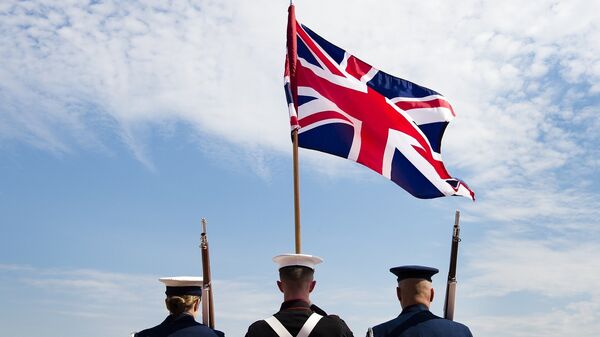Dr David Lowe, Senior Research Fellow at Leeds Beckett has spoken on the creation of the new military division.
Sputnik: An army division specialising in hybrid warfare is being formed under a radical new plan to provide the British military with a cutting edge for 21st-century conflicts. How significant is the creation of this new military division?
David Lowe: I think it's very significant and it's something we've been needing for a while. Certainly when you look at the threats we face and when we think of military, we also have to think of how the military get involved in fighting terrorist groups as well and I think the classic example is Islamic State.
Their media ministry was well developed and very efficient - and we saw the results of it. I've been saying for a few years, one of the things to counteract certainly when they have their self-proclaimed Caliphate in Syria and Iraq, was to if you like, counter their propaganda and start dealing with them and that did happen a couple years ago, but I think it is a time to move forward and we also have to look at any of the external threats.
One of the key things is not just physically on the battlefield; it's out there in the ether with electronic communications in its various forms. So I think this is a very positive step forward.
Sputnik: One of the aims for this new division is to counter hostile states and insurgent groups like Daesh, which succeeded in creating a strong cyber presence. Is it likely to be successful against these sophisticated groups?
David Lowe: Well I think it'll be a classic of whenever there's an initiative brought in by state agencies that those who they're trying to deal with catch, or prevent from carrying out actions, always try and find all the innovative methods of trying to get around it. I think we'll always have that cat mouse played over the coming years but the thing is if you don't do anything and you just leave it to them then what's the choice?
The choice is actually start being active and dealing with them. It is a case of making things uncomfortable for them as possible, putting them on the back foot to be more defensive-minded because they have always been offensive and aggressive out there - it is one of those ways making them think as well. I'm sure as time develops over the coming years they will try and find ways around it and then vice versa, then state agencies like this army division, will then find other ways to try and deal with it as it goes on.
Sputnik: Is this a sign of things to come? For example, will conflicts of the future take place largely in these electronic capacities and frontier?
David Lowe: I think we'll still need that 'boots on the ground warfare' and you're quite right when looking at developments 100 years ago. It's the 100 years anniversary of the First World War and we saw how that changed in the 2nd World War. One thing about warfare it tends to speed up the advance of technology and we have seen that.

If we go back to after Iraq invaded Kuwait and we saw that first Gulf War - you look at how weaponry aircraft and so on has advanced and we're also seeing more and more drone attacks and the use of drones, if you like someone remotely attacking somebody else, then actually in the aircraft and it's also looking all the weaponry where again it's getting dealt with remotely.
That's one big significant move but the bottom line is always I was thinking of going back to the Second World War and the Battle of Britain where it was believed that Hermann Göring thought that the UK could be beaten simply by an air battle. Obviously, it was useful in the fact that the British did defeat the Luftwaffe, but you still need with any conflict, you still need me and boots on the ground. You actually need a physical presence in any future conflict.
I still see the need for infantry divisions, etc. So you look at modern warships, they still have some conventional means of warfare available as well as all the electronic means that we've got. So I think we'll see sophistication but the bottom line sometimes is you still need that physical presence.
The views expressed in this article are solely those of David Lowe and do not necessarily reflect the official position of Sputnik.
*Daesh (also known as ISIS/ISIL/IS) is a terrorist group banned in Russia

